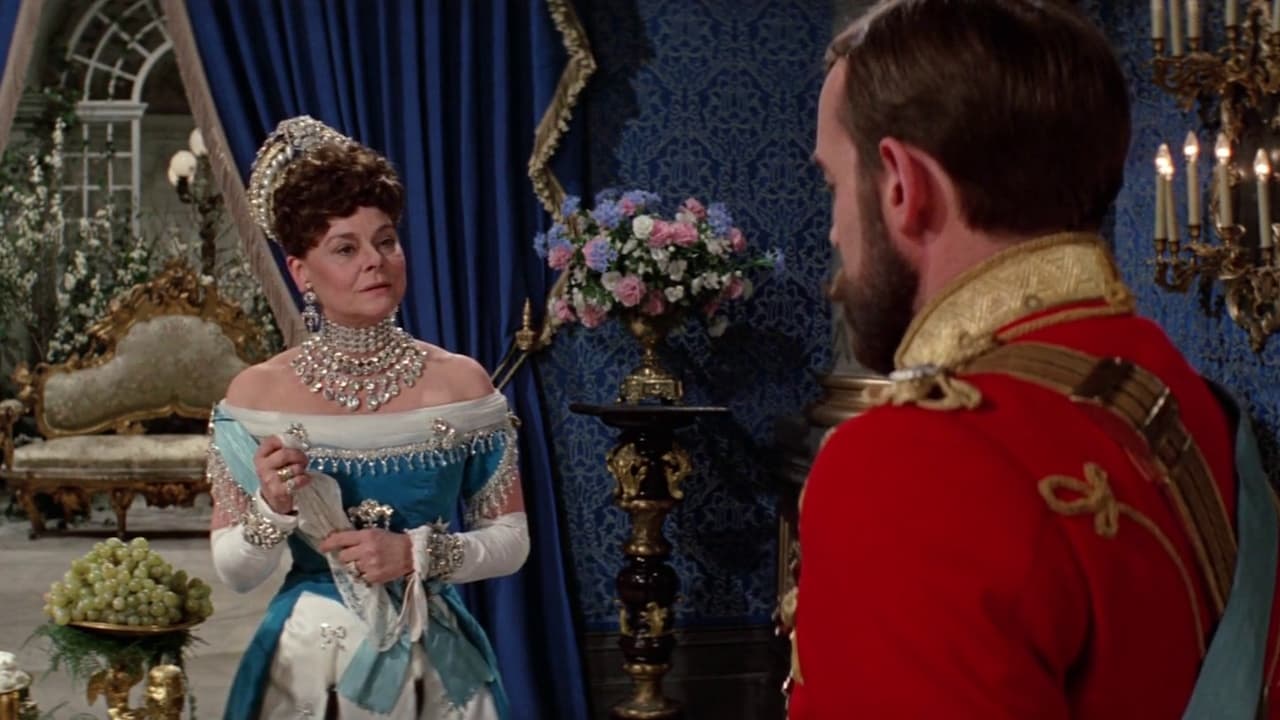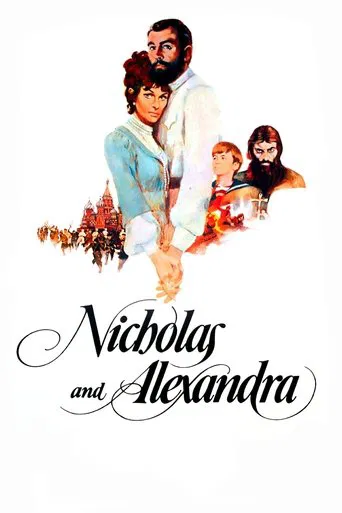

Wonderful character development!
... View MoreVery well executed
... View MoreIt isn't all that great, actually. Really cheesy and very predicable of how certain scenes are gonna turn play out. However, I guess that's the charm of it all, because I would consider this one of my guilty pleasures.
... View MoreClever and entertaining enough to recommend even to members of the 1%
... View MoreEpic and sweeping, a 1972 blockbuster carrying every name in the British character-actor's book and telling the story of a grand leader who was out of touch with his people, and his wife, who was even MORE out of touch. The cute girls and the imperious young boy were innocent but that doesn't help them. Anyone who wants to know what went on during the Russian revolution of 1917 -- the one that brought us the ever-popular Josef Stalin -- ought to see this. Really. It's beautifully photographed, if nothing else.I don't know how closely it hews to historical revolutionary fact. All I know is that the title of Czar or Tsar goes way back. The first guy to claim the title of Caesar was the Roman Augustus, adopted son of Julius Caesar. The Roman Empire fell apart towards the end of the 400s AD and everybody and his brother began to claim the title. By recent times it had been morphed into "Czar" and "Kaiser". Nicholas wasn't the last Caesar to die. That would be Kaiser Wilhelm II, who didn't die until 1941.At any rate, those whose knowledge of recent Russian history is spotty, like mine, will have some of the blanks filled in. I knew Kerensky's was an interim government and that it fell but I never knew why it fell. Now I know it was partly because Kerensky was a "moderate" who wanted to continue Russia's role against Germany/Austria in World War I, at a time when the Russian Army on its western front was underarmed (sometimes completely unarmed) and in a rotten mood, while at home the farmers were starving and rebellious. "Nicky" wasn't able to grasp this, being under the spell of his opulent quarters in the Winter Palace and the spell of his wife, the batty Alexandria. In the face of all this discontent, Nicky felt a firm hand was in order.Well, his firm hand didn't do the trick and he was forced to abdicate. However he and his family wound up in Siberia, not entirely unhappy. But leaders are symbols, even when they're no longer leaders.This film must have had a budget more powerful than Nicky's army against Germany. Thousands of extras. Long shots of empty landscapes drawn as precisely as those in a Rothko painting or on a kid's notebook with a steel-edged ruler. I was really impressed. There aren't any duds among the performances either. Olivier, Hawkins, Andrews, Redrave -- they all soldier on, mostly with improbably shaped mustaches. The film seems to have gone -- not unregarded but unreported. It followed in the wake of some incandescent hits like "Patton" (Fleischer, same director as here) and "Dr. Zhivago" (same period). So, no wonder it was well funded.
... View MoreTom Baker makes a great Rasputin, however the lead actors bored me terribly, so I suppose it doesn't matter that the script was often filled with hokey banal dialogue. The big sin with the film as Hollywood propaganda is that it put all the blame for Russia's problems on the Czar and ignored the treachery and vicious Old Testament-inspired violent sadism of the Bolsheviks, who were not thinking about the good of the Russian people at all, but how they could suck the country dry and use it to further other ambitions (like the globalism which has now led to the present immigration crisis). According to Mark Twain and others, Russia's problems with "usury folk" date back to the 1870s, with assassinations and bad dealings, it had little or nothing to do with Christian intolerance as we have heard.If Hollywood and the Western media was to be believed, Lenin and his friends wanted to help workers, yet we know that perhaps millions of ethnic Russians were killed after the Bolsheviks took control (this was later blamed on Stalin even though he was not in power). The deaths tied to the Czar pale by comparison. Who was the real tyrant? We also learn that George Patton felt so strongly that Communists were the greatest threat, he concluded the US should have sided with Hitler against them! But he died from an "accident" before he could return stateside.The movie serves as an example of how Hollywood sought to portray history in a way that slants it with less than noble aims.Seems like the Rolling Stones song Sympathy for the Devil was hinting at it too:I stuck around St. Petersburg When I saw it was a time for a change Killed the Tsar and his ministers Anastasia screamed in vain
... View More"Nicholas and Alexandra" is one of the last of the grand, sweeping epics that dominated the box office in the 50's and 60's. With the new wave of young, reckless directors who took to the scene in the 70's this kind of filmmaking seemed strangely dated. Ironically enough it kind of mimics the fate of the Romanov family, holding on to ideals that can no longer protect them. The genre, which had started with aplomb with movies like "Gone With The Wind" didn't draw the numbers it used to, and after seeing this movie I can't help but think of what a shame that is.The movie is off to a slow start, and doesn't really grab the viewer until after the introduction of Rasputin. From there on in it's pure cinematic joy to witness the fate of the Tzar and his family unravel. The actors do a tremendous job. It's obvious that the producers wanted their actors to look as much like their characters as possible, and while this doesn't necessarily strengthen the movie by itself it clearly gives it a stronger feel of authenticity. Furthermore they perfectly embody their flawed characters. The czar, beautifully played by Michael Jayston is a warm, caring man who unfortunately is totally unfit to be a czar. He is out of touch with his people, and feebly clings to his autocratic power. Jayston manages to portray an almost absurd certainty in his divine right, and ability to rule while at the same time exposing his uncertainty and fright. Janet Suzman is equally impressive as the loving, but domineering Alexandra.The look and feel of the movie is also fantastic. The jaw-dropping visuals of Russia perfectly accommodates the story, and the music is wonderful all the way through. The pace is slow, and it's easy to see why critics who had just witnessed the exhilarating pace of movies like "A Clockwork Orange" or "The French Connection". But this was how these kinds of movies were made, and "Nicholas and Alexandra" does not shame the genre. It's actually a beautiful end to a spectacular genre which is well worth a look for anyone with a soft spot for David Lean-like movies.
... View MoreRobin Massie wrote one of the more riveting books I have ever read, Nicholas and Alexandra based on the last Czar and Czarina of Russia,Director Franklin Schaffner who did such a brilliant job in directing 'Patton' fails here. The movie is pictorially magnificent and the interior set design impressive but at times dull when compared to the riveting book. Michael Jsyston and Janet Suzman able British actors do not have the charisma to play the Caar and Czarina The Empress was German born and since Russia was at War with Germany thought to be a spy Marlon Brando was offered Rasputin but turned down the role. Tom Baker does well but again as in the case of Jayston and Ms Suzman does not have the stature to play Rasputin. The central theme is that the Crown Prince had hemophilia and the mad monk Rasputin involved himself so unduly in the lives of the Russian Imperial family there were rumors that Rasputin and the German born Czarina were lovers! In Massie's book one chapter ends with the words " Day and Night" Rasputin and Alexandra brought down the Russian Empire" so hated was Rasputin that members of the Imperial Family plotted to kill Rasputin.Legendary Producer Sam Spiegel who produced classics at Columbia such as 'The Bridge On The River Kaw' and 'Lawrence of Arabia' 'On The Waterfront' among other classic films had a star roster of stars who previously starred in his films such as William Holden, Elizabeth Taylor, Peter O Toole, Katharine Hepburn, Marlon Brando etc in his films. Those are the kind of stars that should have been part of this film.I believe this was the last film Sam Spiegel made at Columbia ending a legendary relationship between studio and film maker that won Oscars for The Bridge On The River Kwai and a true masterpiece Lawrence of Arabia.
... View More